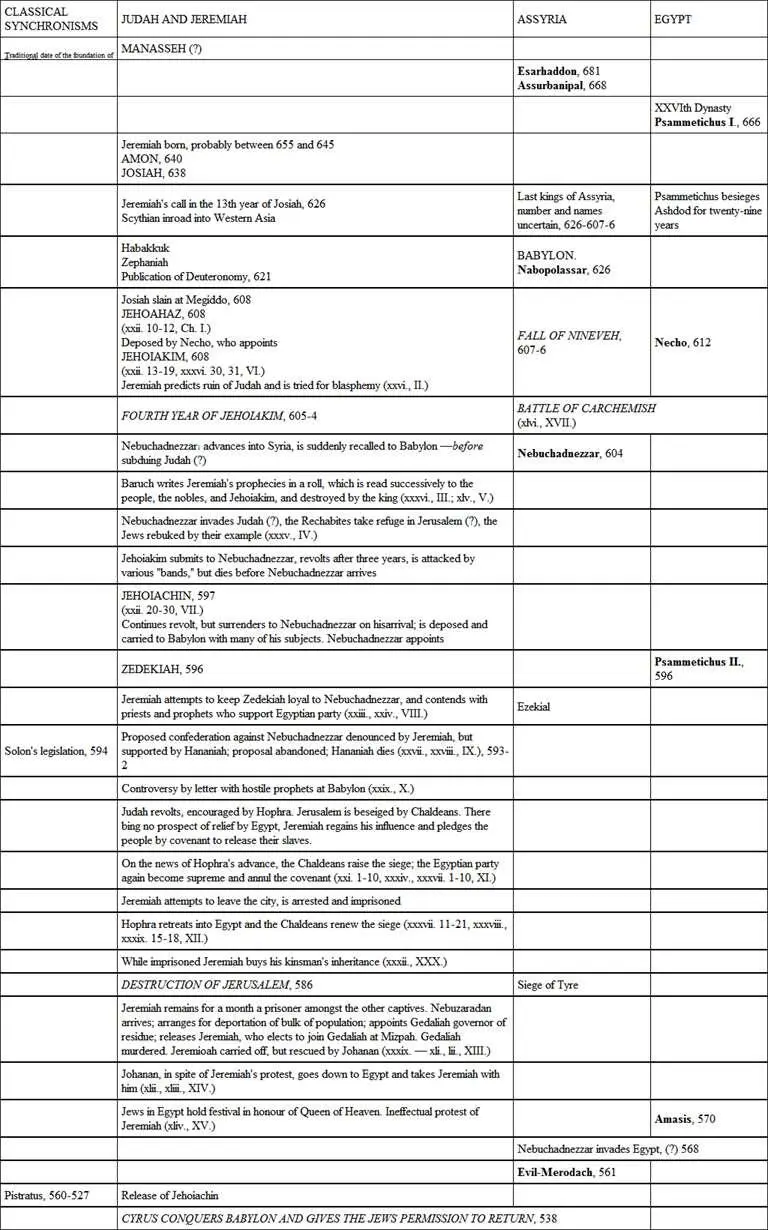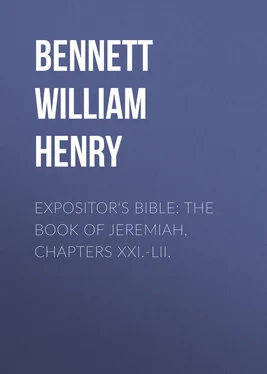William Bennett - Expositor's Bible - The Book of Jeremiah, Chapters XXI.-LII.
Здесь есть возможность читать онлайн «William Bennett - Expositor's Bible - The Book of Jeremiah, Chapters XXI.-LII.» — ознакомительный отрывок электронной книги совершенно бесплатно, а после прочтения отрывка купить полную версию. В некоторых случаях можно слушать аудио, скачать через торрент в формате fb2 и присутствует краткое содержание. Издательство: Иностранный паблик, Жанр: foreign_religion, foreign_antique, foreign_prose, на английском языке. Описание произведения, (предисловие) а так же отзывы посетителей доступны на портале библиотеки ЛибКат.
- Название:Expositor's Bible: The Book of Jeremiah, Chapters XXI.-LII.
- Автор:
- Издательство:Иностранный паблик
- Жанр:
- Год:неизвестен
- ISBN:нет данных
- Рейтинг книги:5 / 5. Голосов: 1
-
Избранное:Добавить в избранное
- Отзывы:
-
Ваша оценка:
- 100
- 1
- 2
- 3
- 4
- 5
Expositor's Bible: The Book of Jeremiah, Chapters XXI.-LII.: краткое содержание, описание и аннотация
Предлагаем к чтению аннотацию, описание, краткое содержание или предисловие (зависит от того, что написал сам автор книги «Expositor's Bible: The Book of Jeremiah, Chapters XXI.-LII.»). Если вы не нашли необходимую информацию о книге — напишите в комментариях, мы постараемся отыскать её.
Expositor's Bible: The Book of Jeremiah, Chapters XXI.-LII. — читать онлайн ознакомительный отрывок
Ниже представлен текст книги, разбитый по страницам. Система сохранения места последней прочитанной страницы, позволяет с удобством читать онлайн бесплатно книгу «Expositor's Bible: The Book of Jeremiah, Chapters XXI.-LII.», без необходимости каждый раз заново искать на чём Вы остановились. Поставьте закладку, и сможете в любой момент перейти на страницу, на которой закончили чтение.
Интервал:
Закладка:
Expositor's Bible: The Book of Jeremiah, Chapters XXI.-LII
PREFACE
The present work deals primarily with Jeremiah xxi. – lii., thus forming a supplement to the volume of the Expositor's Bible on Jeremiah by the Rev. C. J. Ball, M.A. References to the earlier chapters are only introduced where they are necessary to illustrate and explain the later sections.
I regret that two important works, Prof. Skinner's Ezekiel in this series, and Cornill's Jeremiah in Dr. Haupt's Sacred Books of the Old Testament , were published too late to be used in the preparation of this volume.
I have again to acknowledge my indebtedness to the Rev. T. H. Darlow, M.A., for a careful reading and much valuable criticism of my MS.
CHRONOLOGICAL TABLE
In the present stage of investigation of Old Testament Chronology, absolute accuracy cannot be claimed for such a table as the following. Hardly any, if any, of these dates are supported by a general consensus of opinion. On the other hand, the range of variation is, for the most part, not more than three or four years, and the table will furnish an approximately accurate idea of sequences and synchronisms. In other respects also the data admit of alternative interpretations, and the course of events is partly a matter of theory – hence the occasional insertion of (?).

Примечание 1 1 1 For spelling see note, page 4
BOOK I
PERSONAL UTTERANCES AND NARRATIVES
CHAPTER I
INTRODUCTORY: 2 2 Cf. Preface.
JEHOAHAZ
As the prophecies of Jeremiah are not arranged in the order in which they were delivered, there is no absolute chronological division between the first twenty chapters and those which follow. For the most part, however, chapters xxi. – lii. fall in or after the fourth year of Jehoiakim (b. c. 605). We will therefore briefly consider the situation at Jerusalem in this crisis. The period immediately preceding b. c. 605 somewhat resembles the era of the dissolution of the Roman Empire or of the Wars of the French Revolution. An old-established international system was breaking in pieces, and men were quite uncertain what form the new order would take. For centuries the futile assaults of the Pharaohs had only served to illustrate the stability of the Assyrian supremacy in Western Asia. Then in the last two decades of the seventh century b. c. the Assyrian Empire collapsed, like the Roman Empire under Honorius and his successors. It was as if by some swift succession of disasters modern France or Germany were to become suddenly and permanently annihilated as a military power. For the moment, all the traditions and principles of European statesmanship would lose their meaning, and the shrewdest diplomatist would be entirely at fault. Men's reason would totter, their minds would lose their balance at the stupendous spectacle of so unparalleled a catastrophe. The wildest hopes would alternate with the extremity of fear; everything would seem possible to the conqueror.
Such was the situation in b. c. 605, to which our first great group of prophecies belongs. Two oppressors of Israel – Assyria and Egypt – had been struck down in rapid succession. When Nebuchadnezzar 3 3 We know little of Nebuchadnezzar's campaigns. In 2 Kings xxiv. 1 we are told that Nebuchadnezzar "came up" in the days of Jehoiakim, and Jehoiakim became his servant three years. It is not clear whether Nebuchadnezzar "came up" immediately after the battle of Carchemish, or at a later time after his return to Babylon. In either case the impression made by his hasty departure from Syria would be the same. Cf. Cheyne, Jeremiah (Men of the Bible), p. 132. I call the Chaldean king Nebuchadnezzar – not Nebuchadrezzar – because the former has been an English household word for centuries.
was suddenly recalled to Babylon by the death of his father, the Jews would readily imagine that the Divine judgment had fallen upon Chaldea and its king. Sanguine prophets announced that Jehovah was about to deliver His people from all foreign dominion, and establish the supremacy of the Kingdom of God. Court and people would be equally possessed with patriotic hope and enthusiasm. Jehoiakim, it is true, was a nominee of Pharaoh Necho; but his gratitude would be far too slight to override the hopes and aspirations natural to a Prince of the House of David.
In Hezekiah's time, there had been an Egyptian and an Assyrian party at the court of Judah; the recent supremacy of Egypt had probably increased the number of her partisans. Assyria had disappeared, but her former adherents would retain their antipathy to Egypt, and their personal feuds with Jews of the opposite faction; they were as tools lying ready to any hand that cared to use them. When Babylon succeeded Assyria in the overlordship of Asia, she doubtless inherited the allegiance of the anti-Egyptian party in the various Syrian states. Jeremiah, like Isaiah, steadily opposed any dependence upon Egypt; it was probably by his advice that Josiah undertook his ill-fated expedition against Pharaoh Necho. The partisans of Egypt would be the prophet's enemies; and though Jeremiah never became a mere dependent and agent of Nebuchadnezzar, yet the friends of Babylon would be his friends, if only because her enemies were his enemies.
We are told in 2 Kings xxiii. 37 that Jehoiakim did evil in the sight of Jehovah according to all that his father had done. Whatever other sins may be implied by this condemnation, we certainly learn that the king favoured a corrupt form of the religion of Jehovah in opposition to the purer teaching which Jeremiah inherited from Isaiah.
When we turn to Jeremiah himself, the date "the fourth year of Jehoiakim" reminds us that by this time the prophet could look back upon a long and sad experience; he had been called in the thirteenth year of Josiah, some twenty-four years before. With what sometimes seems to our limited intelligence the strange irony of Providence, this lover of peace and quietness was called to deliver a message of ruin and condemnation, a message that could not fail to be extremely offensive to most of his hearers, and to make him the object of bitter hostility.
Much of this Jeremiah must have anticipated, but there were some from whose position and character the prophet expected acceptance, even of the most unpalatable teaching of the Spirit of Jehovah. The personal vindictiveness with which priests and prophets repaid his loyalty to the Divine mission and his zeal for truth came to him with a shock of surprise and bewilderment, which was all the greater because his most determined persecutors were his sacerdotal kinsmen and neighbours at Anathoth. "Let us destroy the tree," they said, "with the fruit thereof, and let us cut him off from the land of the living, that his name may be no more remembered." 4 4 xi. 19.
He was not only repudiated by his clan, but also forbidden by Jehovah to seek consolation and sympathy in the closer ties of family life: "Thou shalt not take a wife, thou shalt have no sons or daughters." 5 5 xvi. 2.
Like Paul, it was good for Jeremiah "by reason of the present distress" to deny himself these blessings. He found some compensation in the fellowship of kindred souls at Jerusalem. We can well believe that, in those early days, he was acquainted with Zephaniah, and that they were associated with Hilkiah and Shaphan and King Josiah in the publication of Deuteronomy and its recognition as the law of Israel. Later on Shaphan's son Ahikam protected Jeremiah when his life was in imminent danger.
Интервал:
Закладка:
Похожие книги на «Expositor's Bible: The Book of Jeremiah, Chapters XXI.-LII.»
Представляем Вашему вниманию похожие книги на «Expositor's Bible: The Book of Jeremiah, Chapters XXI.-LII.» списком для выбора. Мы отобрали схожую по названию и смыслу литературу в надежде предоставить читателям больше вариантов отыскать новые, интересные, ещё непрочитанные произведения.
Обсуждение, отзывы о книге «Expositor's Bible: The Book of Jeremiah, Chapters XXI.-LII.» и просто собственные мнения читателей. Оставьте ваши комментарии, напишите, что Вы думаете о произведении, его смысле или главных героях. Укажите что конкретно понравилось, а что нет, и почему Вы так считаете.












